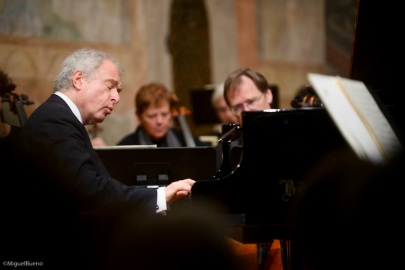
(c) Miguel Bueno
One of the several highlights at this year’s Lucerne Easter Festival for me was the performance by András Schiff, his keyboard partner Schaghajegh Nosrati, and the Cappella Andrea Barca. An evening of superb music-making.
The conceit of the program was to play works — by J.S. Bach and Mozart — only in C minor. That tonality has no monolithic connotation, of course (even in Beethoven you can find variance). What’s more, aside from contemporary aesthetic theories that did ascribe particular qualities to C minor, they all end of contradicting one another. Not to mention that the change in historical pitch over time is such that “C minor” for Bach isn’t even the same key, objectively speaking, as later.
So I can’t say I came away with any particular new insights into C minor or the affective use of tonality, with the exception perhaps of the concluding work, Mozart’s K. 491 Piano Concerto. But the focus anyway was on exquisite communication of shared values among like-minded musicians — and, here, Schiff & Co. provided pleasure and insight aplenty. The ensemble, by the way, is teasingly described by Schiff as a tribute to its fictional namesake, a peasant “probably born between 1730 and 1735 in the Marignolle hills near Florence [who] had a close connection to Mozart, for whose private concert of 2 April 1770 at the Villa Poggio Imperiale in Florence he was said to have served as page turner.” Rrright….
I was also delighted to get to experience the incredibly talented young German-Iranian pianist Schaghajegh Nosrati, who alternated with her mentor Schiff as the lead on a pair of Bach double concertos for keyboard — played here, naturally, on Schiff’s beloved Bösendorfers. Their styles make for some really interesting contrasts: Schiff’s BWV 1060 was almost geometrically precise, beautifully manicured, while Nosrati seemed more song-oriented, her cantabile in the Andante of BWV 1062 taking rapturous flight.
After intermission, Schiff and his ensemble treated us to meditations on the regis thema from Bach’s Musical Offering: the C minor theme supplied by King Frederick II, with which Bach built this endlessly fascinating edifice.
Schiff really does approach Bach as a sacred text. It’s not about trying to put his stamp on this music or to somehow make it new with an unexpected interpretive decision here, an infusion of personality there. Instead, Schiff gives you the impression of turning a key in the lock, opening up a treasure box or the entrance to a magical labyrinth.
With Mozart’s K. 491, on the other hand, I did sense a personal stamp, but not by way of indulgent effusions of emotion or “expressivity.” In fact, I don’t think I’ve experienced a more deeply engaging live account of this concerto, of which, according to lore, Beethoven was particularly envious. (There’s no question that he was lastingly inspired by it.)
What Schiff and his colleagues brought out was a subtler pathos — quite different from Beethoven and the later Romantic readings of C minor — that made Mozart’s incomparable feeling of balance and proportion utterly vivid and rich in meaning.
Earlier, the winds had provided a sort of interlude, playing Mozart’s K. 388 (384a) Nacht Musique, but they were in even more eloquent form here, where that choice suddenly made sense, given the special prominence of the winds in the scoring of K. 491. The finale’s variations conveyed something deeply enigmatic.
As encore: Schiff played a to-die-for account of Schubert’s C minor Allegretto D. 915.
Filed under: Uncategorized




